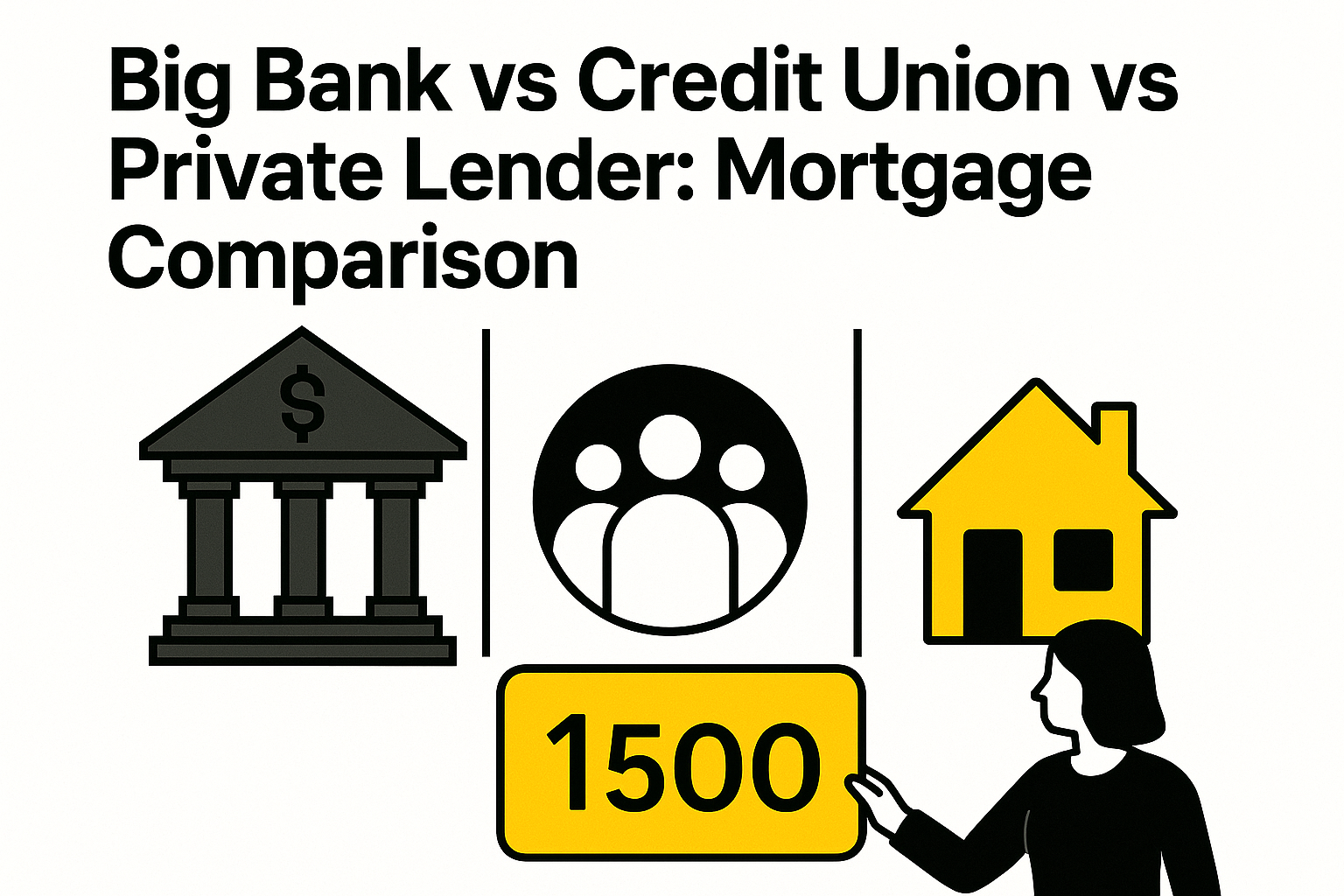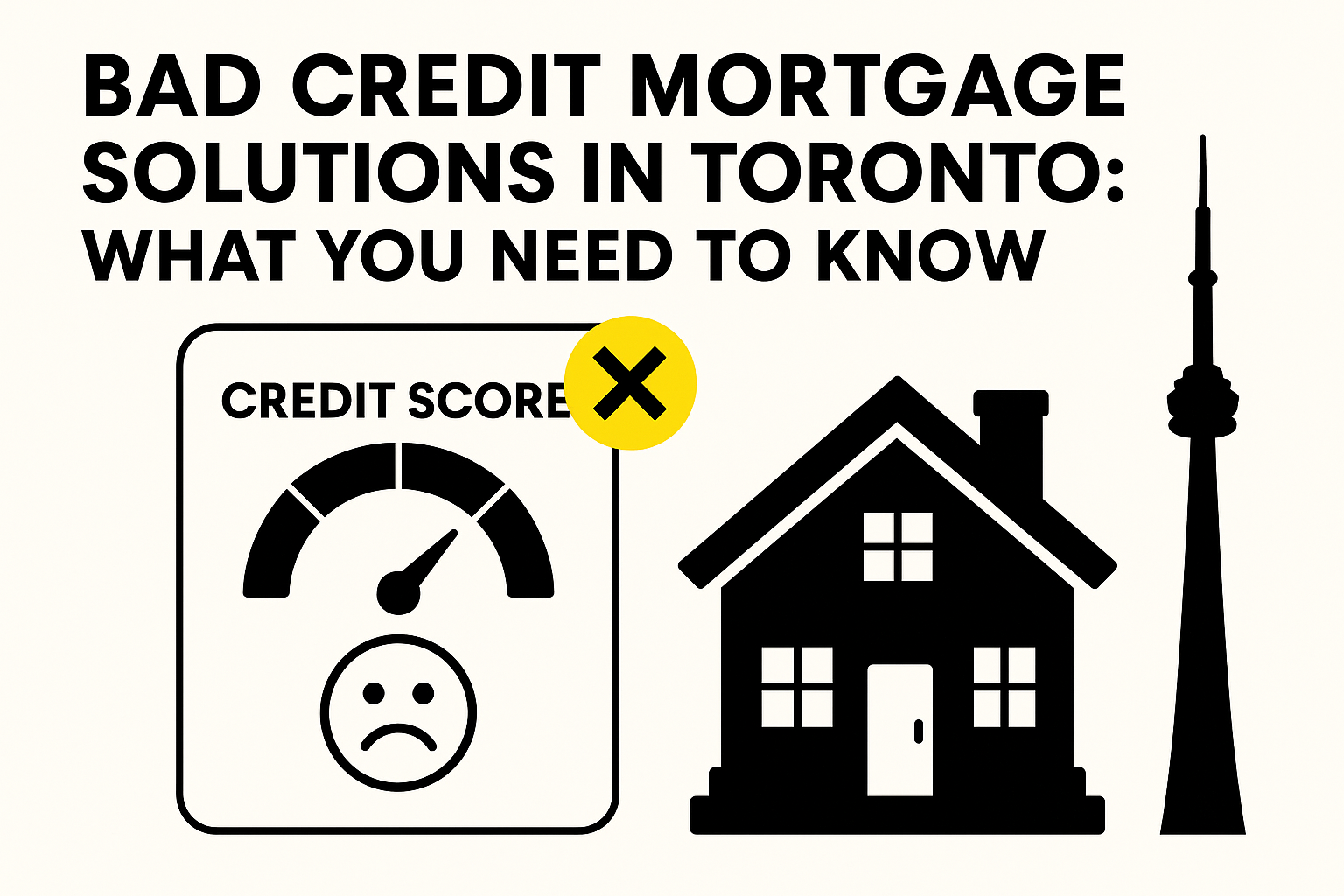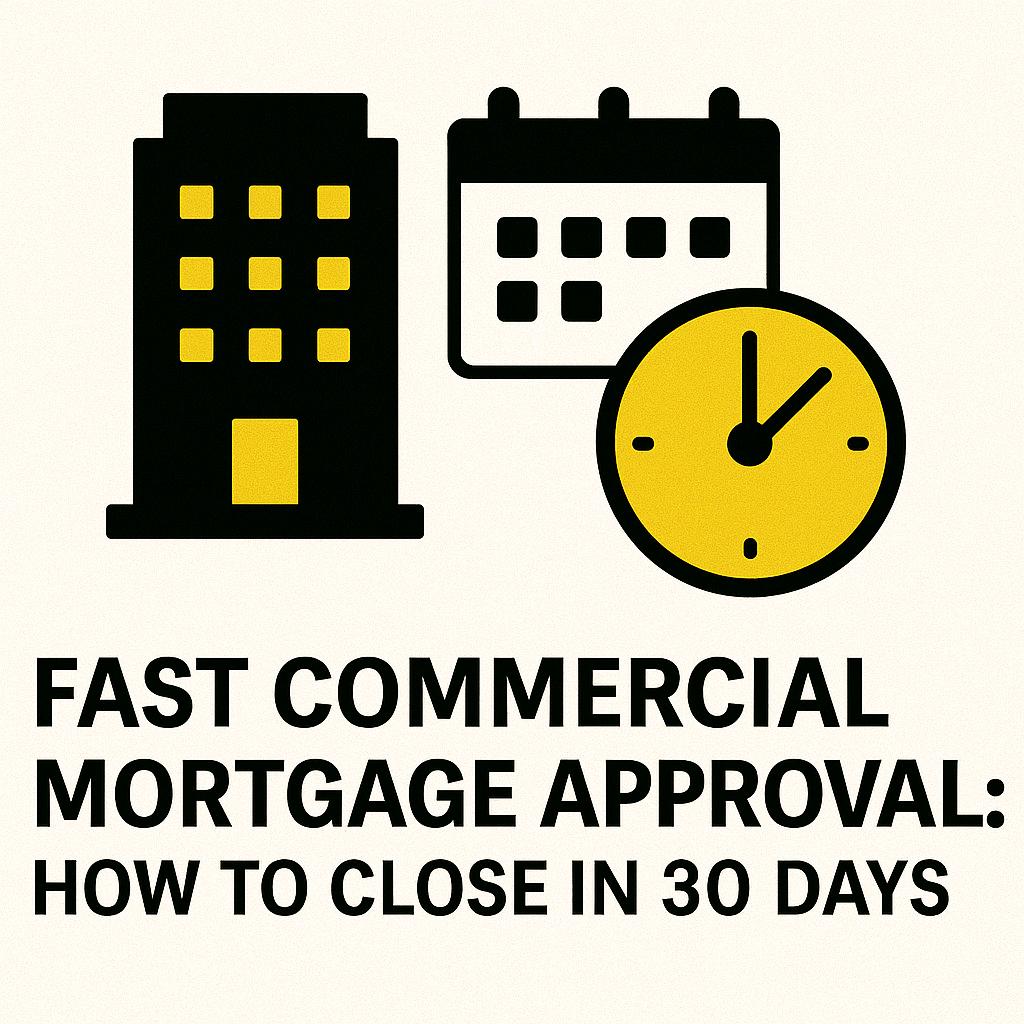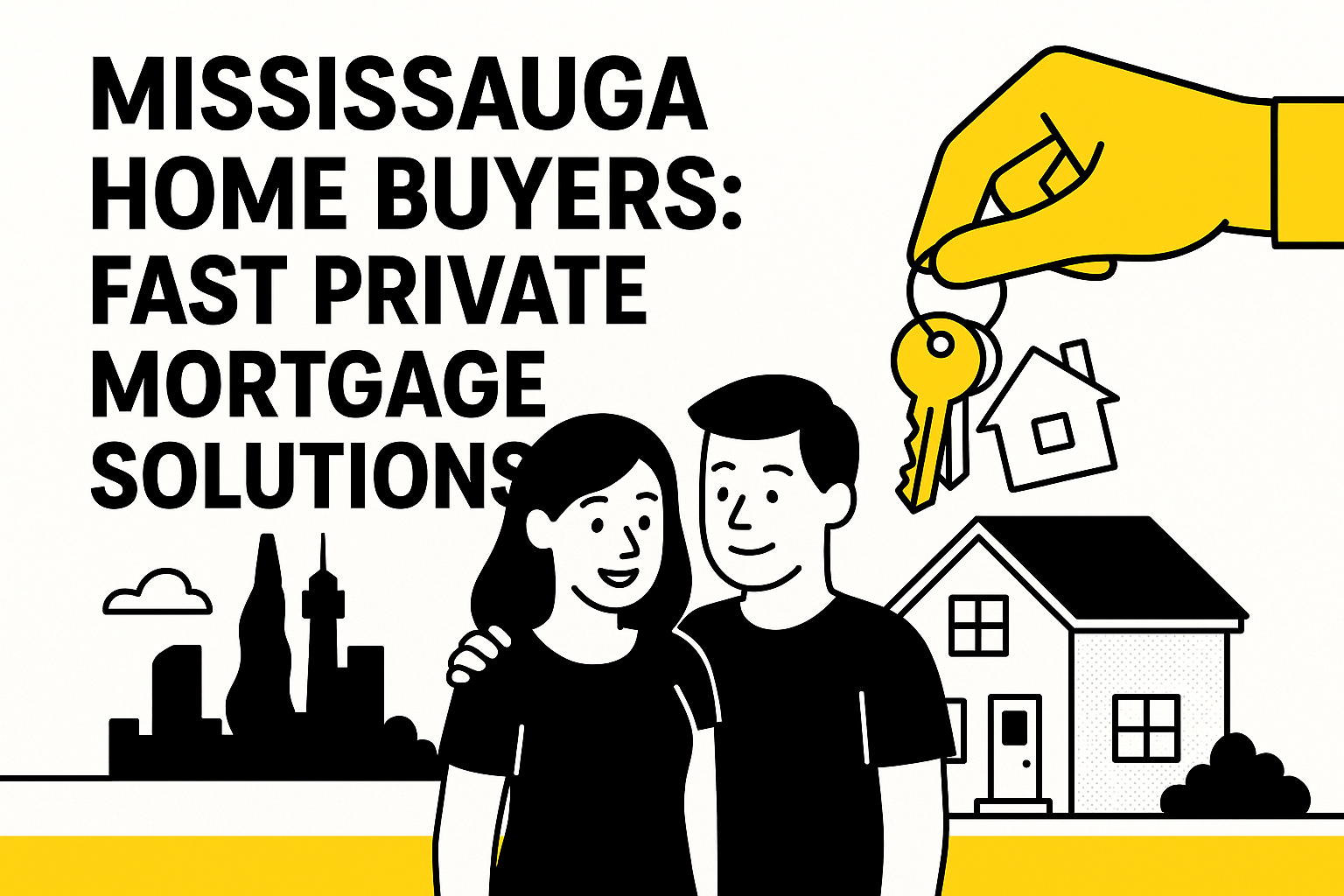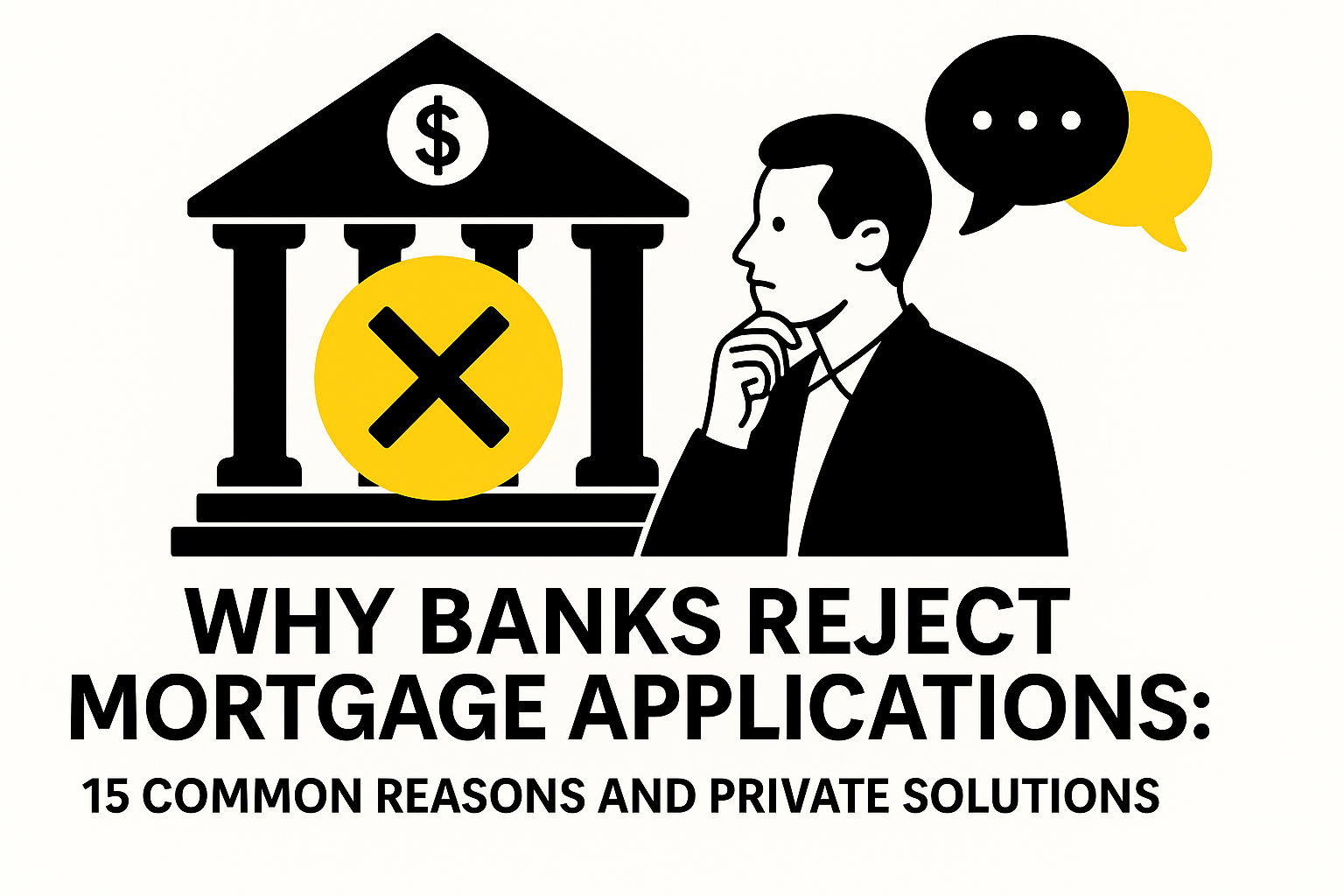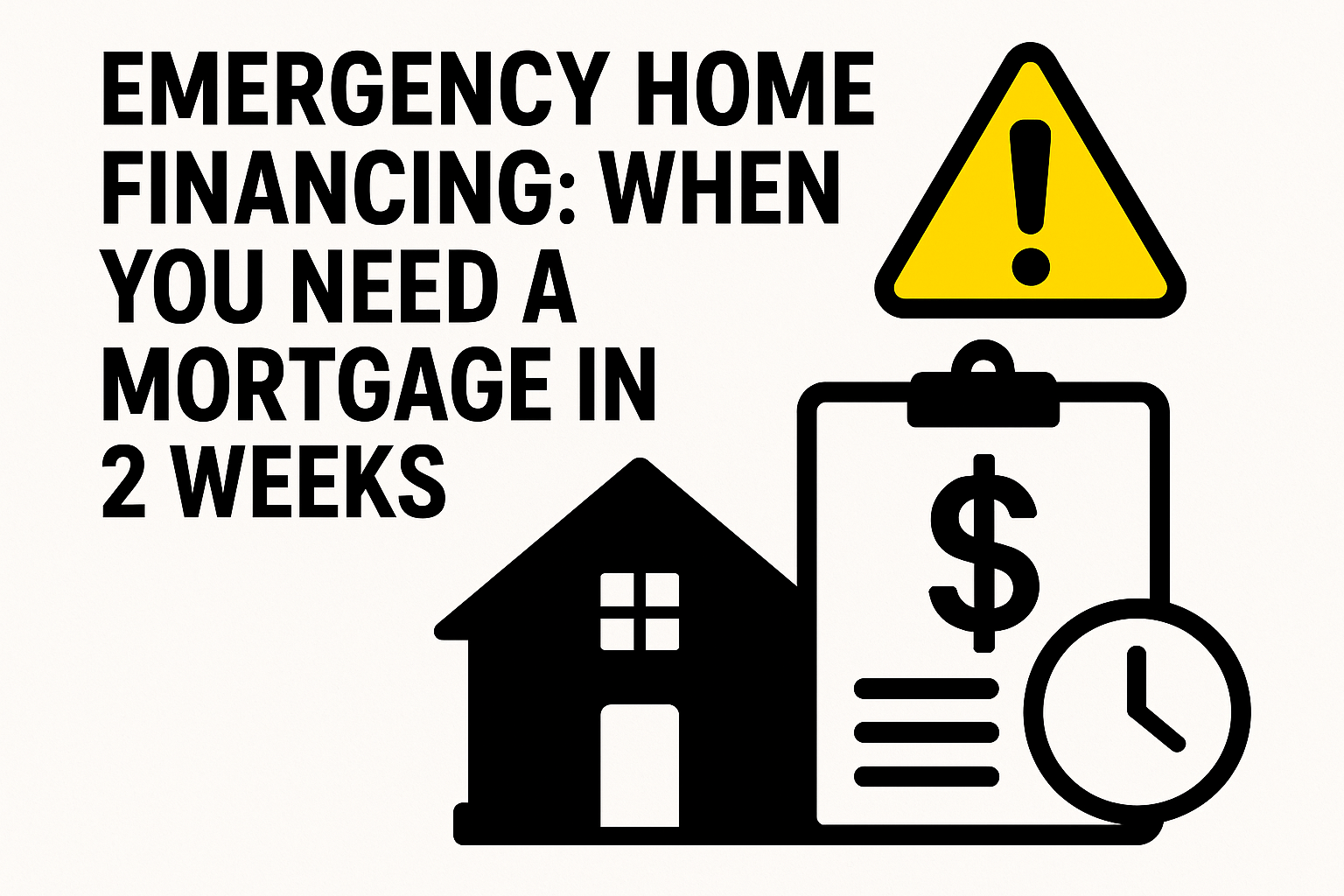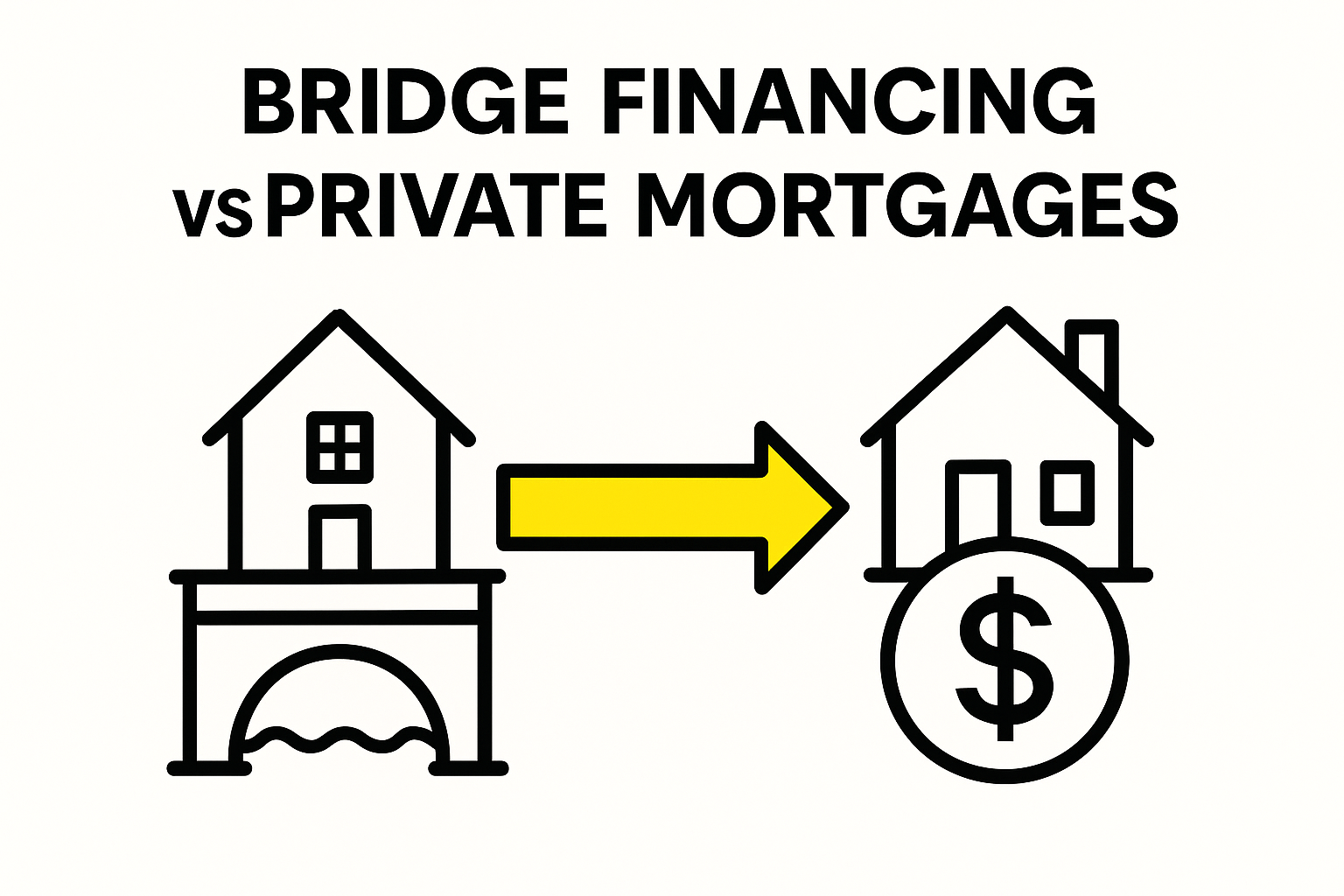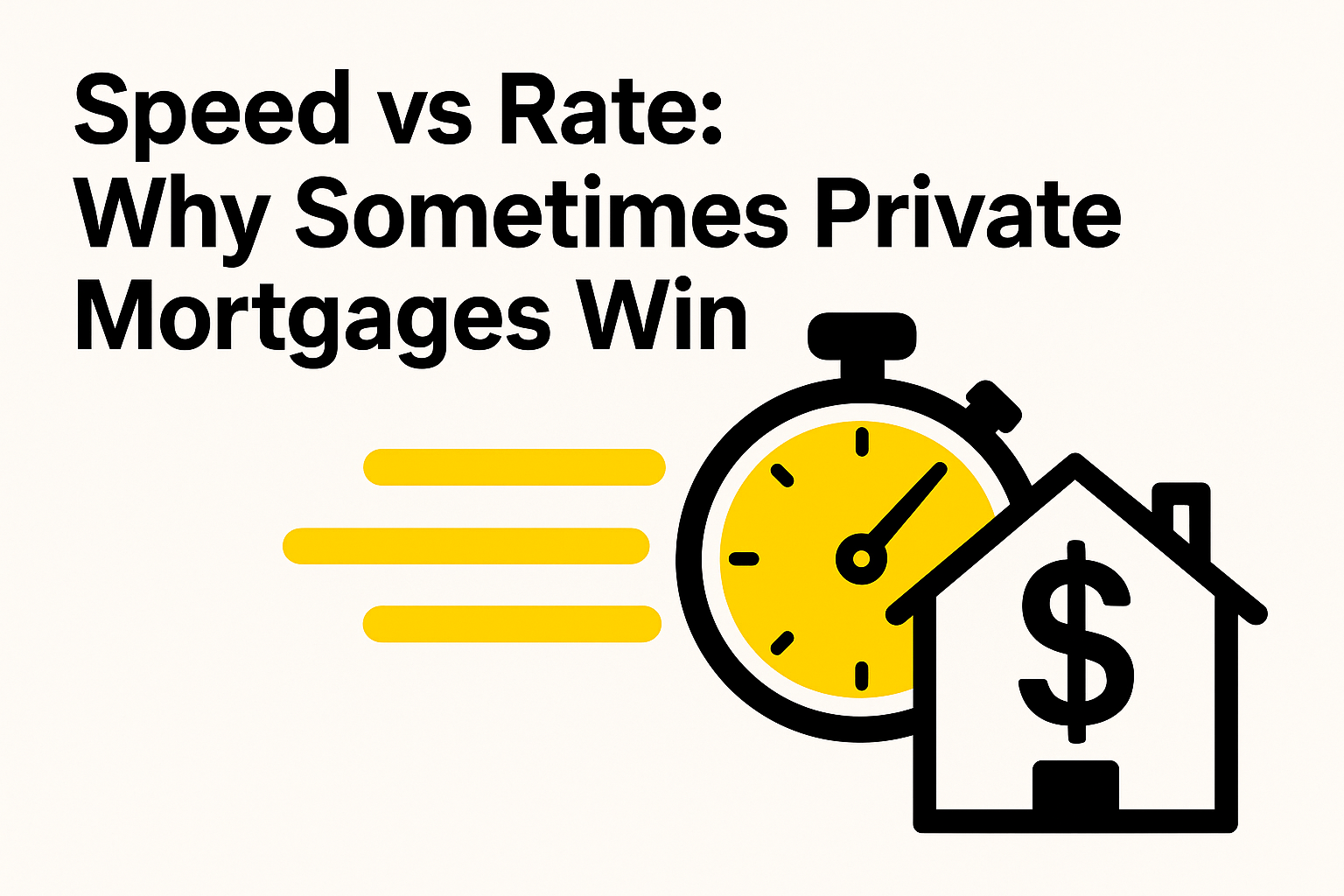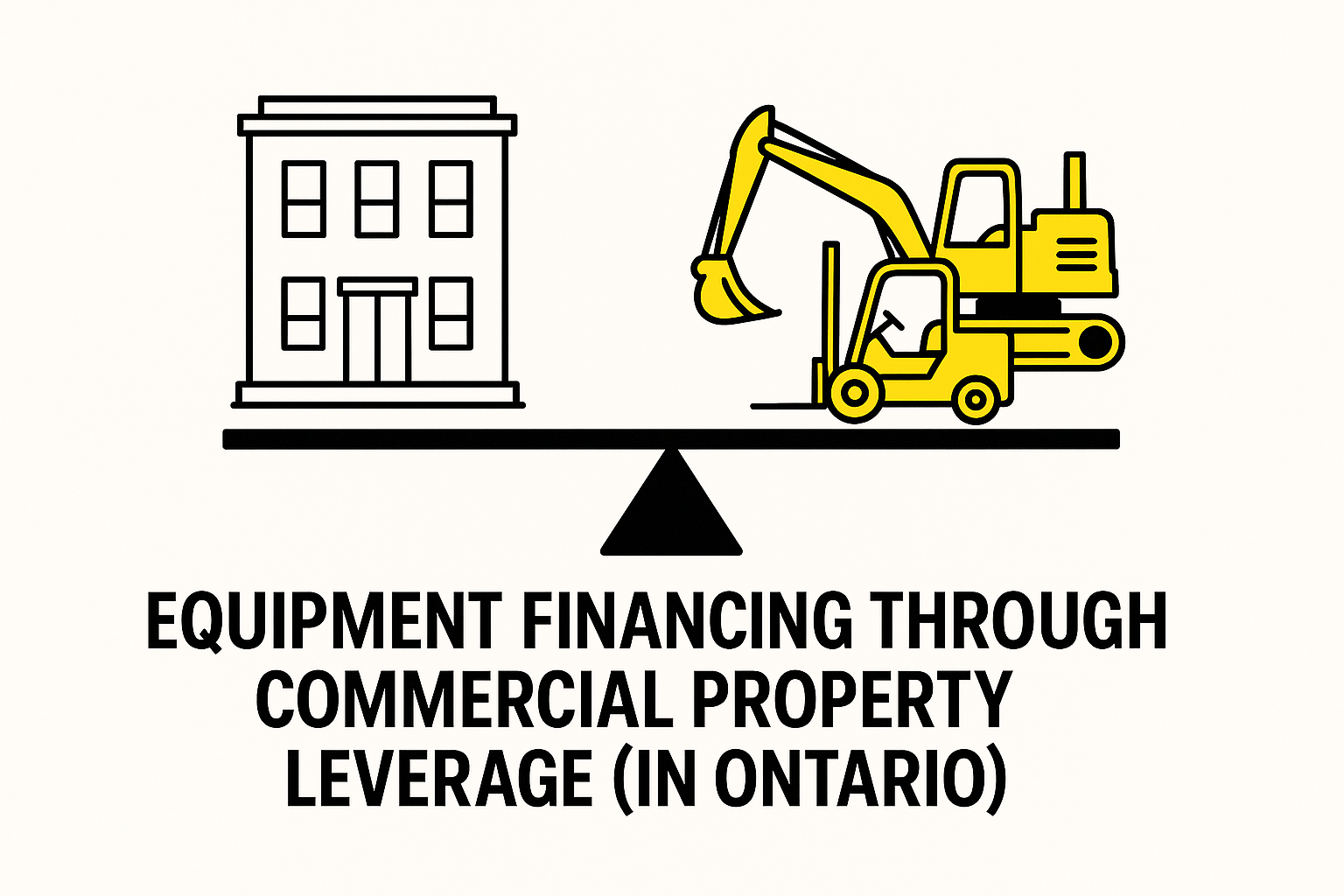Imagine three different borrowers with identical $500,000 mortgage needs: one gets approved by RBC at 6.2% after 6 weeks of documentation, another secures 5.8% from their local credit union in 3 weeks with personalized service, while the third receives emergency approval from a private lender at 8.5% in just 5 days when timing was critical for their purchase. Each borrower made the right choice for their specific situation, yet most Canadians automatically default to big banks without considering alternatives that might serve them better. This hypothetical scenario illustrates how different lender types excel in different circumstances, making the “best” mortgage lender entirely dependent on your individual needs, timeline, financial situation, and priorities rather than any universal ranking system.
The mortgage lending landscape offers three distinct paths that most borrowers never properly compare: traditional big banks with their standardized processes and competitive rates, credit unions with their member-focused service and flexible underwriting, and private lenders with their speed and approval flexibility for unique situations. Understanding the real differences between these options – not just interest rates, but approval criteria, service quality, flexibility, and total costs – can save thousands of dollars and prevent financing disasters that occur when borrowers choose the wrong lender type for their specific circumstances and timeline requirements.
Big Banks: The Traditional Powerhouse
Advantages of Major Bank Financing
Canada’s big six banks – RBC, TD, Scotia, BMO, CIBC, and National Bank – dominate the mortgage market for good reasons. They offer some of the lowest advertised rates, have extensive branch networks, and provide integrated banking services that simplify financial management for many borrowers.
Big banks excel at straightforward mortgage applications involving employed borrowers with excellent credit, standard properties, and conventional down payments. Their streamlined processes, automated underwriting systems, and competitive pricing make them efficient choices for borrowers who fit their qualification criteria perfectly.
The rate advantage can be significant – big banks often offer promotional rates 0.25-0.5% below credit unions and 2-4% below private lenders. For a $400,000 mortgage, this could save $1,000-2,000 annually compared to credit unions and much more compared to private options.
Hidden Costs and Limitations
Despite competitive advertised rates, big banks often have hidden costs and rigid qualification requirements that eliminate many borrowers or increase actual borrowing costs above advertised figures.
Penalty structures tend to favor the bank heavily, with prepayment penalties that can cost thousands if you need to break your mortgage early. The Interest Rate Differential (IRD) calculations used by major banks often result in penalties far exceeding those charged by credit unions or private lenders.
Big bank underwriting has become increasingly algorithmic and inflexible. Self-employed borrowers, those with non-traditional income, unique properties, or complex financial situations often face automatic rejection regardless of their actual ability to service mortgage payments.
When Big Banks Make the Most Sense
Big banks work best for borrowers with traditional employment with steady T4 income and excellent credit scores, standard properties in established neighborhoods, conventional financing needs with 20%+ down payments, and long-term stability who plan to hold mortgages without major changes.
If you fit the ideal big bank borrower profile, their combination of low rates, extensive services, and proven stability makes them hard to beat for straightforward mortgage needs.
Credit Unions: The Community Alternative
Membership Benefits and Personalized Service
Credit unions operate as member-owned cooperatives, creating fundamentally different relationships with borrowers compared to profit-focused banks. This structure often translates into more personalized service, flexible underwriting, and decision-making authority at the local level.
Credit union mortgage specialists typically handle fewer files than big bank representatives, allowing for more detailed attention to individual circumstances and creative solutions for borrowers who don’t fit standard qualification templates.
The membership structure also means credit unions share profits with members through better rates, lower fees, or dividend payments rather than maximizing shareholder returns like traditional banks.
Rate Advantages and Flexible Underwriting
Credit unions often offer mortgage rates competitive with or better than big banks, especially for members with existing relationships. Their lower overhead and cooperative structure can translate into savings passed on to borrowers.
More importantly, credit unions frequently demonstrate greater flexibility in underwriting decisions. They may accept alternative income documentation, consider local employment knowledge, or make exceptions for unique circumstances that big bank systems automatically reject.
Credit union underwriters often have more authority to approve exceptions, waive certain requirements, or structure mortgages creatively to help members qualify when traditional banks say no.
Geographic and Membership Limitations
Credit union services are geographically limited to their service areas, which can create challenges for borrowers moving between provinces or purchasing properties outside their credit union’s territory.
Membership requirements may limit access – some credit unions require employment in specific industries, residence in certain areas, or membership in affiliated organizations before you can access their mortgage services.
Credit unions also have limited branch networks compared to big banks, though many now offer online services and partner with other credit unions to provide broader service access for members.
Private Lenders: The Flexible Solution
Speed and Approval Flexibility
Private lenders excel where traditional financial institutions fail – providing fast approvals for borrowers with non-standard situations, unique properties, or urgent timeline requirements that banks and credit unions cannot accommodate.
Private lender approval processes focus on property value, borrower equity, and realistic repayment ability rather than rigid qualification criteria that exclude many capable borrowers from traditional financing options.
The speed advantage is dramatic – private lenders can often approve and fund mortgages in 1-2 weeks compared to 4-8 weeks for traditional lenders, making them essential for competitive real estate markets or time-sensitive purchases.
Cost Structure and Risk Considerations
Private mortgage rates typically range from 7-12%, significantly higher than bank or credit union rates. However, this cost comparison must consider the opportunity cost of not securing financing when traditional options aren’t available.
Private lenders charge various fees that banks don’t typically impose – lender fees, broker commissions, legal costs, and administrative charges that can add $3,000-8,000 to total borrowing costs.
The higher rates reflect the additional risk that private lenders accept by financing situations that traditional lenders reject. They’re compensated for providing access to capital when other options don’t exist.
Ideal Scenarios for Private Lending
Private lenders provide optimal solutions for emergency financing when traditional approval timelines are too slow, self-employed borrowers whose income doesn’t meet bank documentation requirements, credit rebuilding situations, unique properties including rural homes or heritage properties, and investment opportunities requiring fast closing.
Private lending works best as strategic short-term financing with clear plans for transitioning to traditional mortgage options once circumstances improve or timing pressures resolve.
Head-to-Head Comparison Analysis
Interest Rates and Total Cost Comparison
Current Rate Ranges:
- Big Banks: 5.8-6.5% for qualified borrowers
- Credit Unions: 5.6-6.2% for members
- Private Lenders: 7.0-12.0% depending on risk factors
However, total cost analysis must include fees, penalties, and flexibility value beyond just interest rates.
$400,000 Mortgage Annual Cost Comparison:
- Big Bank (6.2%): $24,800 interest + potential high penalties
- Credit Union (5.9%): $23,600 interest + lower penalty risk
- Private Lender (9.0%): $36,000 interest + various fees
Approval Speed and Requirements
Typical Approval Timelines:
- Big Banks: 3-6 weeks with complete documentation
- Credit Unions: 2-4 weeks with personalized review process
- Private Lenders: 5-10 days for most applications
Documentation Requirements: Big banks require extensive third-party verification, credit unions offer some flexibility while maintaining documentation standards, and private lenders focus on essential information with streamlined verification.
Service Quality and Relationship Management
Big banks provide efficient but often impersonal service with limited flexibility for individual circumstances. Representatives handle large caseloads and work within strict guidelines.
Credit unions typically offer more personalized service with decision-makers who understand local markets and member situations. The cooperative structure creates incentives to find solutions rather than following rigid policies.
Private lenders focus on getting deals done rather than following standardized processes. Service quality varies significantly, but the best private mortgage specialists provide highly responsive, flexible service focused on problem-solving.
Qualification Requirements Across All Three
Income and Credit Score Thresholds
Big Banks:
- Credit Score: 680+ preferred, 620 minimum for most programs
- Income: Traditional employment with 2+ years history, debt service ratios under 42%
- Documentation: Full income verification, employment confirmation, extensive third-party validation
Credit Unions:
- Credit Score: 650+ preferred, may consider 600+ with compensating factors
- Income: More flexible with seasonal, commission, or variable income
- Documentation: Standard verification with local knowledge consideration
Private Lenders:
- Credit Score: 550+ acceptable, focus on equity rather than credit history
- Income: Alternative documentation accepted, focus on cash flow capacity
- Documentation: Streamlined verification emphasizing property value
Down Payment and Equity Requirements
Big banks offer high-ratio mortgages with 5% down through CMHC insurance but prefer 20%+ to avoid insurance premiums and access best rates.
Credit unions provide similar down payment options with potentially more flexible qualification for high-ratio mortgages based on member relationships and local market knowledge.
Private lenders typically require 20-25% down payment minimum, with better rates and terms for borrowers providing 30%+ equity positions.
Property Type and Location Factors
Big banks prefer standard residential properties in established urban markets with strong comparable sales data and good liquidity characteristics.
Credit unions may show more flexibility for properties in their service territories, including rural properties or unique homes that local underwriters understand better than automated systems.
Private lenders often specialize in properties that traditional lenders avoid – rural homes, heritage properties, properties requiring renovation, or unique buildings that don’t fit standard lending criteria.
Here’s your lender comparison framework:
| Factor | Big Banks | Credit Unions | Private Lenders |
| Interest Rates | 5.8-6.5% | 5.6-6.2% | 7.0-12.0% |
| Approval Speed | 3-6 weeks | 2-4 weeks | 5-10 days |
| Credit Requirements | 680+ preferred | 650+ preferred | 550+ acceptable |
| Down Payment | 5-20% | 5-20% | 20-25%+ |
| Service Style | Standardized | Personalized | Problem-solving |
| Best For | Standard situations | Members, local markets | Unique situations |
This framework helps identify which lender type aligns best with your specific mortgage needs and borrower profile.
Real-World Scenarios: Which Lender Wins When
First-Time Homebuyers
Best Choice: Credit Unions or Big Banks
First-time buyers with steady employment and good credit often benefit from credit union personalized service and first-time buyer programs, or big bank competitive rates and integrated banking services.
Credit unions may offer better rates for members and more flexible qualification for borderline applications. Big banks provide extensive first-time buyer resources and promotional rates.
Private lenders rarely make sense for first-time buyers unless traditional options are unavailable due to credit or employment issues.
Self-Employed Borrowers
Best Choice: Private Lenders or Specialized Credit Union Programs
Self-employed borrowers face systematic rejection from big banks due to income documentation challenges that automated underwriting cannot accommodate effectively.
Credit unions with local market knowledge may understand seasonal businesses or professional practices better than big bank algorithms, making them viable options for established self-employed borrowers.
Private lenders excel for self-employed borrowers whose tax-optimized income doesn’t reflect their actual earning capacity, offering stated income programs and alternative documentation approaches.
Investment Property Purchases
Best Choice: Depends on Timeline and Borrower Profile
Big banks offer competitive investment property rates for qualified borrowers but have strict qualification requirements and slower approval timelines that may not work in competitive markets.
Credit unions may provide more flexible underwriting for investment properties, especially in their service territories where they understand rental markets and property values.
Private lenders work well for investment properties requiring fast closing, unique properties that banks won’t finance, or borrowers using creative financing strategies.
Emergency Financing Situations
Best Choice: Private Lenders
When timing is critical – financing fallthrough, competitive market purchases, or bridge financing needs – private lenders provide the only realistic solution for approvals within 1-2 weeks.
Big banks and credit unions cannot compress their approval timelines sufficiently for true emergency situations, regardless of borrower qualifications or willingness to pay premium rates.
The higher cost of private emergency financing often proves worthwhile compared to losing property purchases or paying breach of contract penalties.
Additional information about mortgage lending options is available through Mortgage Professionals Canada.
Making the Right Choice for Your Situation
Assessing Your Borrower Profile
Honestly evaluate your borrower profile against each lender type’s strengths:
Choose Big Banks if: You have excellent credit, traditional employment, standard property, and want the lowest possible rates with integrated banking services.
Choose Credit Unions if: You value personalized service, have membership eligibility, need flexible underwriting, or want competitive rates with better penalty structures.
Choose Private Lenders if: You need fast approval, have non-standard income or credit, are purchasing unique properties, or traditional lenders have declined your application.
Timeline and Service Preferences
Consider your timeline requirements and service preferences when choosing between lender types. If you have time for traditional approval processes and prefer lowest rates, big banks or credit unions work well.
If timing is critical or you need problem-solving rather than standardized processing, private lenders provide essential flexibility despite higher costs.
Long-Term Financial Strategy
Consider how your lender choice fits your long-term financial strategy. Big banks and credit unions work well for borrowers planning long-term mortgages with stable financial situations.
Private lenders work best as strategic short-term solutions with clear plans for transitioning to traditional financing once circumstances improve.
Frequently Asked Questions
Which lender type offers the best mortgage rates? Credit unions often have the best rates for members, followed closely by big banks for qualified borrowers. Private lenders cost significantly more but serve different purposes when traditional financing isn’t available.
How long does approval take with each lender type? Big banks typically take 3-6 weeks, credit unions 2-4 weeks, and private lenders 5-10 days. However, these timelines vary based on application complexity and borrower responsiveness.
Can I switch lender types during the application process? Yes, but switching can delay your timeline and may require starting over with documentation. It’s better to choose the right lender type initially based on your specific situation.
Do credit unions offer mortgages to non-members? Most credit unions require membership before providing mortgage services, but membership requirements are often minimal – sometimes just opening a savings account with a small deposit.
Will using a private lender hurt my ability to get bank financing later? No, successful private mortgage management often strengthens future bank applications by demonstrating payment ability and property ownership. Banks evaluate current circumstances more than previous financing sources.
Which lender type is best for first-time homebuyers? Credit unions often provide the best combination of competitive rates and personalized service for first-time buyers. Big banks offer extensive resources and promotional programs. Private lenders are rarely necessary unless traditional options aren’t available.
Conclusion
The best mortgage lender depends entirely on your specific situation, timeline, financial profile, and priorities rather than any universal ranking of lender types. Big banks excel for straightforward applications from qualified borrowers who prioritize lowest rates and integrated banking services, while credit unions provide personalized service and flexible underwriting for members at competitive rates. Private lenders serve crucial roles for borrowers needing fast approval, facing unique circumstances, or dealing with properties and situations that traditional lenders won’t accommodate, despite higher costs that reflect their specialized service and risk acceptance.
Success in mortgage financing comes from choosing the lender type that aligns with your actual needs rather than automatically defaulting to the most familiar option or lowest advertised rate. The borrowers who achieve the best outcomes are those who honestly assess their borrower profile, timeline requirements, and financial situation to select lenders equipped to serve their specific circumstances effectively, whether that means big bank efficiency, credit union flexibility, or private lender problem-solving capabilities.
Need help choosing the right lender type for your mortgage situation? Contact HERCULES Team Investment Group today to analyze your borrower profile, compare lender options, and develop financing strategies that align with your timeline, budget, and long-term homeownership goals through expert guidance and market knowledge.

